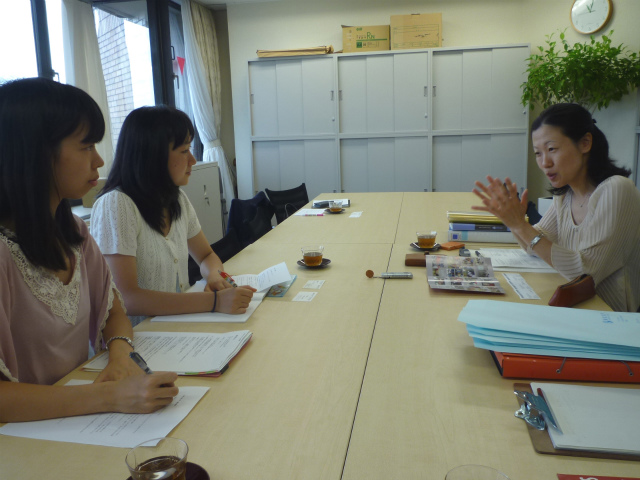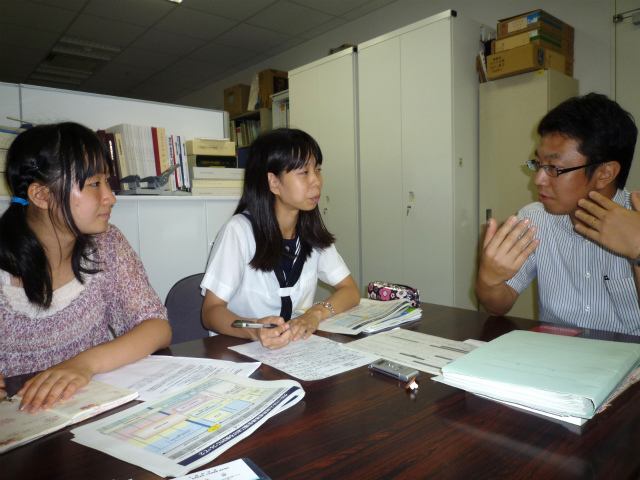December 16, 2012 By Mayu Takizawa (14)
A news article about the University of Tokyo planning to change its enrollment of undergraduate students from spring to autumn caught my eye. Then many questions emerged: What exactly does autumn enrollment mean? Will it have a positive impact on junior and senior high school students? What kind of problems are anticipated?
I had interviews with the University of Tokyo, business people, the Ministry of Education, Culture, Sports, Science and Technology, and the Tokushima University to study this issue.

Ms. Taeko Onodera, Manager for Long-term planning, General Affairs and Planning Department, University of Tokyo stated “we have not yet officially decided to change to autumn enrollment, but we are considering this system quite seriously. Mr. Junichi Hamada, the President of our university is eager to support students to be more global minded, having the intelligence and social skills necessary to challenge world taking risks. He believes that autumn enrollment is instrumental towards this goal.”
There are some issues to be resolved in regard to this change including a so-called “gap term” and conflict with the current employment process. Gap term is a new phrase coined by the University of Tokyo meaning the period between April to September when students graduating high school do not have classes to attend. Students are encouraged to participate in volunteer activities during this term. Ms. Onodera explained the university’s strong commitment saying “We would like to offer students volunteer activity programs and study programs including activities in foreign countries with financial support. Then students can make valuable use of this time. As to employment, companies’ policies are becoming more flexible to hire graduates throughout the year. It is necessary to change our current education system otherwise Japan will lose global competition. The University of Tokyo is expected to take leadership in globalizing our academic system and driving Japan to reform itself entirely.”
Ms. Tomoko Hasegawa, Deputy Director, Public Relations Bureau, Keidanren (Japan Federation of Economic Organizations), said Keidanren is also aiming to support the cultivation of globally-minded people and welcomes the autumn enrollment as a measure for internationalizing Japanese. However, she does not agree with all Japanese universities’ changing to fall enrollment. Keidanren is ready to support those colleges which are heading for internationalization.

According to Mr. Shun Shirai, Deputy Director, University Promotion Division, Ministry of Education, the Ministry is going to endorse the introduction of autumn enrollment. However, they need to work with the business community and other relevant ministries to solve the conflict with current recruitment procedures and the national examination calendars. In addition, it is not easy to provide a subsidy for the operational cost of such introduction because such subsidies come from taxpayers. That said, making Japan adopt a global standard is significant and the Ministry is going to cooperate with universities as much as possible.
Mr. Yoshihisa Takaishi, Vice President, Executive Director for Education and Students Affairs, the Tokushima University said “Today the issue of globalization is a common topic throughout Japan. As a whole, the country must move forward to become global. Our graduate program has already started to adopt the autumn term enrollment as a measure of globalization.” The Tokushima University is ready to introduce the autumn enrollment system for undergraduates, too if there is public support to cover transitional costs and solve the national examination scheduling problem, the Tokushima University is a regional public university which has many science courses including medicine, dentistry, pharmacology, and engineering.
What obstacles are expected from the introduction of the autumn enrollment? One is the corporate recruitment procedure. The University of Tokyo and Keidanren realize that many corporations are hiring new graduates throughout the year, but the Ministry of Education said that most newly hired employees start working from spring and recruitment throughout the year is exceptional. As to the national examinations held only once a year, graduates in the autumn enrollment system would have to wait for the next year’s examination. Students who finish high school in spring will not have a stable position nor identity until autumn and this point must be clarified. If they find temporary jobs and gain some income during the gap term, they would surely have to pay social security tax. Can we solve all these issues?
Throughout these interviews, the recognition of the autumn enrollment system was the same; it is a measure to globalize Japan. Japan is aiming to be more global to beat competition with foreign countries. Some universities are for the autumn enrollment and others seek alternative measures to be global. We should keep tabs on their various approaches.
